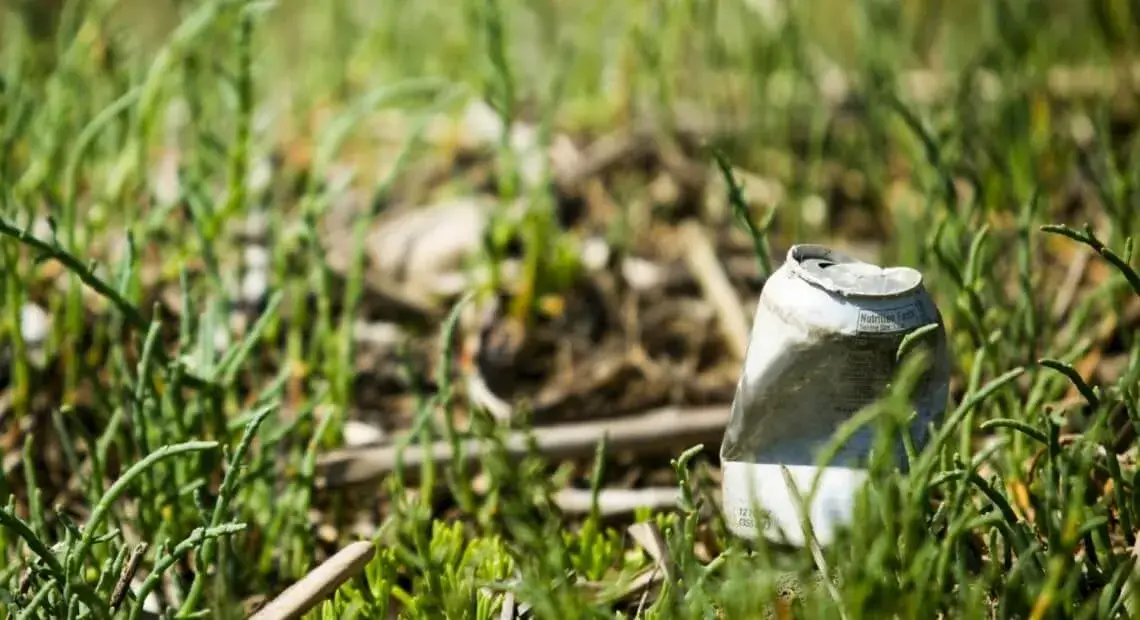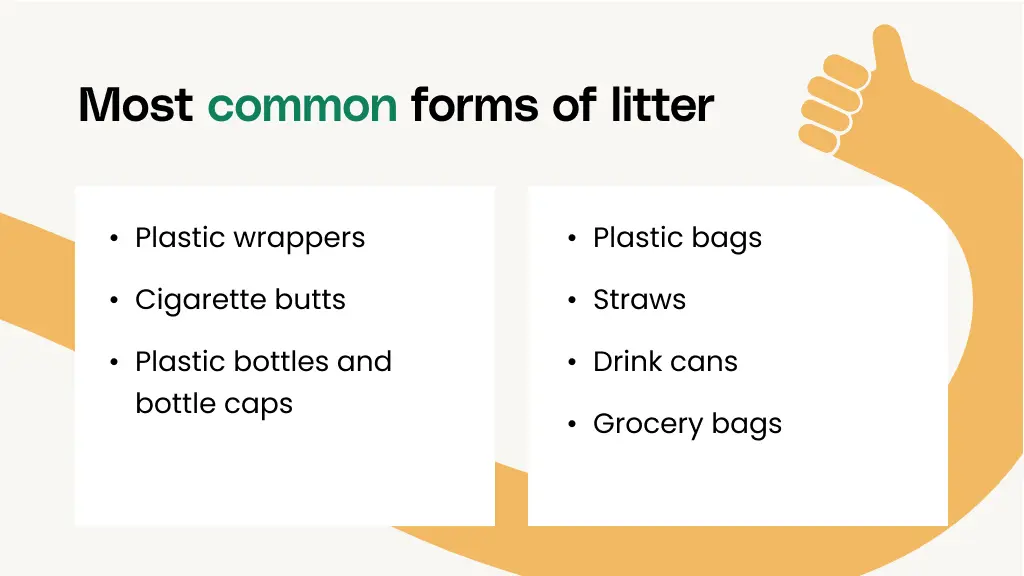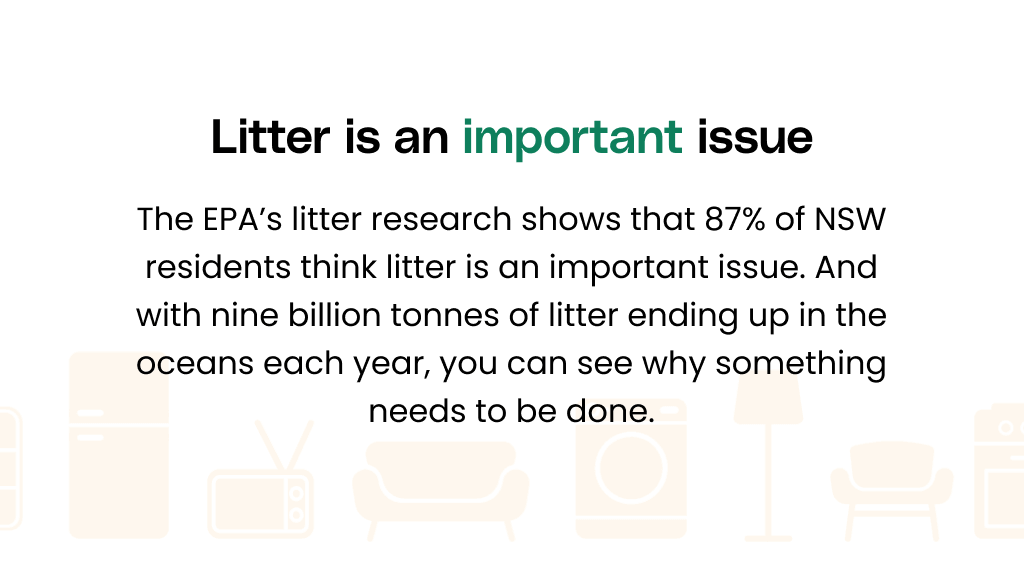
Littering is one of the most harmful actions any individual can undertake impacting the environment. From rubbish bins to recycling skips for paper and plastics, and even compost bins – there is a correct place for every kind of waste out there, and it is not the ground.
So, how does littering affect the environment? There are many harmful impacts of littering, and the consequences of littering extend beyond the environment.
At Ridly, we pride ourselves on providing Sydney’s most sustainable rubbish removal service. If like us, the thought of littering has you shaking in your boots, you’re not alone. However, unfortunately, there are still people out there who do not fully understand the consequences of littering. Within this article, we aim to provide more clarification of the hazards surrounding littering and what you can do to combat improper waste management.
Litter is the name of any item or substance that is disposed of incorrectly. Litter only becomes litter when it is discarded. Litter isn’t just plain old trash; litter encompasses toxic substances that are incorrectly disposed of, chemical runoff, and illegally dumped goods. Littering can occur both intentionally and unintentionally, but there can be severe environmental consequences regardless of how it happened.
Beyond just the unsightly appearance, litter creates plenty of health and safety issues for humans, wildlife, and the planet.

Why Do People Litter?
Laziness and carelessness have fostered today’s culture of habitual littering. Careless individuals and organisations throw rubbish away anywhere without considering the consequences of littering. Many individuals underestimate the negative impacts of their actions, thinking that their personal actions will not effect society as a whole. Yet because this is a widespread misconception, it has led to many individuals taking up this carelessness contributing to our massive litter problem.
Unfortunately, when people see litter already in an area, this is often taken as a cue to add to the build-up rather than try to rectify the mistake.
8 Primary Consequences of Littering
1. Pollution
How does litter affect the environment? Pollution. As litter degrades, small chemicals and microparticles are released into the environment. These are unnatural chemicals and interact poorly with the landscape. Cigarette butts can contain chemicals such as arsenic which is highly toxic to humans and animals and can easily make its way into waterways if not disposed of correctly.
2. Effects Wildlife
Animals are the innocent victims impacted by discarded litter every day. It’s estimated that over one million animals are killed every year after swallowing or becoming trapped in discarded waste. Plastic litter is the most prevalent killer of marine animals, especially with thousands of dolphins, fish, turtles, and whales drowning after becoming entangled in or ingesting plastic litter.
Animals are in continual search of food. When our littered food waste begins to intrigue animals, they begin to explore further away from their natural habitats, posing risks to the animals and the individuals or groups nearby. Litter from discarded food and drinks can also increase the likelihood of animal encroachment on urban land and even cause attacks.

3. Visually Unappealing
A continual build-up of litter somewhere makes a place look unclean and incredibly unpleasant across residential, commercial, and public areas.
If you have ever arrived at a quiet beach to see the landscape littered with rubbish, then you know what we mean. Not only is this sort of scenario an eyesore, but it can also carry many germs and attract unwanted attention from animals. Litter in public places, on the streets, and in tourist spots can drastically downgrade the overall appeal of these areas.
4. Contaminates Groundwater
Humans, animals, and agriculture all need clean water to thrive. One or a combination of litter, chemical runoff, illegal dumping, and tobacco products can easily seep down into the groundwater and seriously effect water quality for people. Litter also causes blockages of storm-water drains that can cause flooding. Even improperly disposed of food and organic waste can cause toxic algae blooms in water, effecting the quality of life for other marine animals.
White goods that aren’t recycled or resold are often left to rot in landfills. These landfills have an intensely negative effect on their local and wider environments, sending toxins into the atmosphere and disrupting natural ecosystems.
5. Promotes Disease
Many examples of litter can carry germs that end up rapidly spreading. As a result of this uncontained spread, germs begin to fester and form a breeding ground for bacteria. This leads to heightened exposure to humans from deadly diseases. As a consequence of littering, diseases such as cholera or typhoid can be spread from litter, getting into water sources or carried by pets into households.
6. The Ecosystem
So, how does littering affect the environment and the ecosystem? Our natural environment is fragile and does not respond well to many littering.
Throwing away cigarettes, for example, can cause huge issues. Cigarette butts take around ten years to completely decompose due to the amount of cellulose acetate in their makeup. There is a widespread perception that cigarette butts decompose very quickly. But in reality, cigarette butts are a severe threat to the environment, as they contain toxic substances like arsenic which can contaminate soil and water. The population of Australia are very familiar with bushfires, which can be caused by individuals throwing a lit cigarette out improperly.
Litter that is tossed directly into the ocean can travel long distances with the currents and winds of the ocean. This litter is responsible for effecting marine life and birds, plastic bags can asphyxiate marine animals and fish, whilst birds can easily entangle themselves in plastic six-pack rings. This litter can also make its way onto beaches, get stuck in fishing nets, and damage boat motors.
Many other forms of litter can take decades or hundreds, or even th ousands of years to decompose. And if left untreated in the environment, it can effect its surroundings several as it slowly decomposes.

7. Monetary Cost
Beyond physical environmental litter effects, one of the other more serious consequences of littering is the high cost to taxpayers to pick up, prevent, or reverse the effects of littering. Litter can clog up waterways and cause pipes to burst, leading to substantial water outages and further disruptions and costs to local communities. Cleaning up all sorts of litter requires a significant economic effort. The monetary outlay for these efforts would be drastically reduced and could be redirected to other environmental projects if individuals correctly disposed of rubbish in the first place.
8. Fines
Littering is against the law. Not only will littering bring about consequences for the environment, but also for the individual. Fines can reach up to $1000 for littering offences in NSW. Undoubtedly, these penalties immediately impact littering effects and changing behaviours; however, proper education and raising awareness is central to guaranteeing long-term results.
How can you help prevent littering effects?
As mentioned, there are wide-ranging consequences of littering. Beyond just environmental effects, there are personal, societal, and financial consequences. It is up to us as individuals to take steps to take responsibility for the waste we generate. You can be more conscious of the trash your household or workplace produces, pick up litter when you see it and encourage those around you to be more conscientious. With the certainty of rubbish build-up in your home or workplace, you will need to get a proper rubbish removal service is to make sure it is appropriately handled.
Still wondering, “how does littering affect the environment?” Well, let us get litter out of the equation altogether. Starting at only $69, Ridly offers an environmentally friendly solution for all your household litter. Our team will come to your house for a great price to collect all your unwanted rubbish and make sure they are disposed of correctly. At Ridly, we take pride in being Australia’s premier sustainable rubbish removal service. Call us on 0491 181 130 or request a quote online for any inquiries about getting rid of your waste.